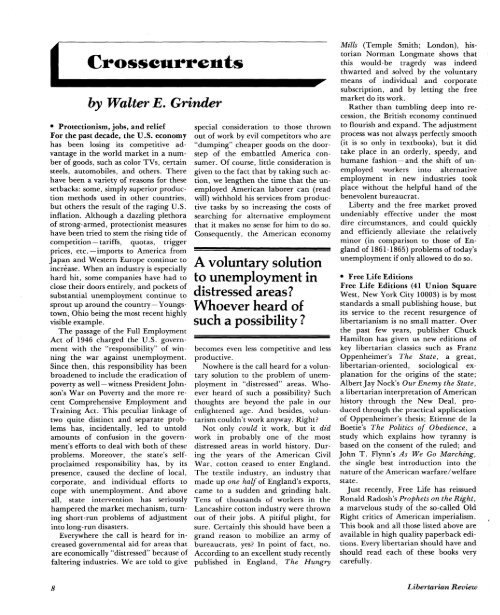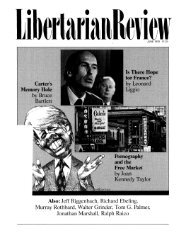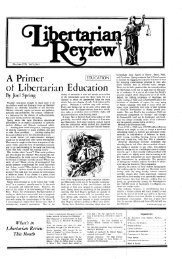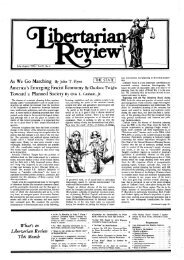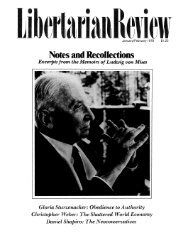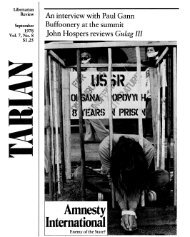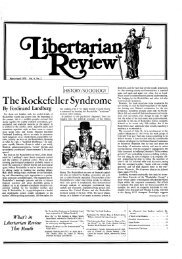The Libertarian Review July 1978 - Libertarianism.org
The Libertarian Review July 1978 - Libertarianism.org
The Libertarian Review July 1978 - Libertarianism.org
You also want an ePaper? Increase the reach of your titles
YUMPU automatically turns print PDFs into web optimized ePapers that Google loves.
I Crosseurrentsby Walter E. Grinder• Protectionism, jobs, and reliefFor the past decade, the u.s. economyhas been losing its competitive advantagein the world market in a numberof goods, such as color TVs, certainsteels, automobiles, and others. <strong>The</strong>rehave been a variety of reasons for thesesetbacks: some, simply superior productionmethods used in other countries,but others the result of the raging U.s.inflation. Although a dazzling plethoraof strong-armed, protectionist measureshave been tried to stem the rising tide ofcompetition- tariffs, quotas, triggerprices, etc. -imports to America fromJapan and Western Europe continue toincrease. When an industry is especiallyhard hit, some companies have had toclose their doors entirely, and pockets ofsubstantial unemployment continue tosprout up around the country- Youngstown,Ohio being the most recent highlyvisible example.<strong>The</strong> passage of the Full EmploymentAct of 1946 charged the U.s. governmentwith the "responsibility" of winningthe war against unemployment.Since then, this responsibility has beenbroadened to include the eradication ofpoverty as well-witness President Johnson'sWar on Poverty and the more recentComprehensive Employment andTraining Act. This peculiar linkage oftwo quite distinct and separate problemshas, incidentally, led to untoldamounts of confusion in the government'sefforts to deal with both of theseproblems. Moreover, the state's selfproclaimedresponsibility has, by itspresence, caused the decline of local,corporate, and individual efforts tocope with unemployment. And aboveall, state intervention has seriouslyhampered the market mechanism, turningshort-run problems of adjustmentinto long-run disasters.Everywhere the call is heard for increasedgovernmental aid for areas thatare economically "distressed" because offaltering industries. We are told to givespecial consideration to those thrownout of work by evil competitors who are"dumping" cheaper goods on the doorstepof the embattled America consumer.Of course, little consideration isgiven to the fact that by taking such action,we lengthen the time that the unemployedAmerican laborer can (readwill) withhold his services from productivetasks by so increasing the costs ofsearching for alternative employmentthat it makes no sense for him to do so.Consequently, the American economyA voluntary solutionto unem.ploym.ent indistressed areas?Whoever heard ofsuch a possibility?becomes even less competitive and lessproductive.Nowhere is the call heard for a voluntarysolution to the problem of unemploymentin "distressed" areas. Whoeverheard of such a possibility? Suchthoughts are beyond the pale in ourenlightened age. And besides, voluntarismcouldn't work anyway. Right?Not only could it work, but it didwork in probably one of the mostdistressed areas in world history. Duringthe years of the American CivilWar, cotton ceased to enter England.<strong>The</strong> textile industry, an industry thatmade up one half of England's exports,came to a sudden and grinding halt.Tens of thousands of workers in theLancashire cotton industry were thrownout of their jobs. A pitiful plight, forsure. Certainly this should have been agrand reason to mobilize an army ofbureaucrats, yes? In point of fact, no.According to an excellent study recentlypublished in England, <strong>The</strong> HungryMills (Temple Smith; London), historianNorman Longmate shows thatthis would-be tragedy was indeedthwarted and solved by the voluntarymeans of individual and corporatesubscription, and by letting the freemarket do its work.Rather than tumbling deep into recession,the British economy continuedto flourish and expand. <strong>The</strong> adjustmentprocess was not always perfectly smooth(it is so only in textbooks), but it didtake place in an orderly, speedy, andhumane fashion- and the shift of unemployedworkers into alternativeemployment in new industries tookplace without the helpful hand of thebenevolent bureaucrat.Liberty and the free market provedundeniably effective under the mostdire circumstances, and could quicklyand efficiently alleviate the relativelyminor (in comparison to those of Englandof 1861-1865) problems of today'sunemployment if only allowed to do so.• Free Life EditionsFree Life Editions (41 Union SquareWest, New York City 10003) is by moststandards a small publishing house, butits service to the recent resurgence oflibertarianism is no small matter. Overthe past few years, publisher ChuckHamilton has given us new editions ofkey libertarian classics such as FranzOppenheimer's <strong>The</strong> State, a great,libertarian-oriented, sociological explanationfor the origins of the state;Albert Jay Nock's Our Enemy the State,a libertarian interpretation of Americanhistory through the New Deal, producedthrough the practical applicationof Oppenheimer's thesis; Etienne de laBoetie's <strong>The</strong> Politics of Obedience, astudy which explains how tyranny isbased on the consent of the ruled; andJohn T. Flynn's As We Go Marching,the single best introduction into thenature of the American warfare/welfarestate.Just recently, Free Life has reissuedRonald Radosh's Prophets on the Right,a marvelous study of the so-called OldRight critics of American imperialism.This book and all those listed above areavailable in high quality paperback editions.Every libertarian should have andshould read each of these books verycarefully.8<strong>Libertarian</strong> <strong>Review</strong>


